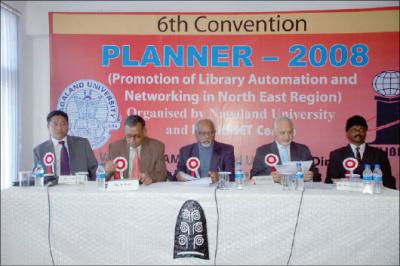|
Information
and Library Network (INFLIBNET) Centre, Ahmedabad in collaboration with Nagaland University organized two-day convention on November 6th
and 7th in Dimapur. The convention, inaugurated by Nagaland University Vice
Chancellor Prof. K Kannan, was attended by more than 160 participants from different
parts of India. The convention, named 'PLANNER-2008' (Promotion of Library
Automation and Networking in North East Region) was held at the School of
Engineering Technology and School of Management, Dimapur campus, under the theme
"open access, open source and open libraries".

Governor of Nagaland K Sankaranarayanan in his message said information technology
and its automation have created opportunities for knowledge-sharing and
collaboration in a way that was unimaginable a few years ago. "Open source software
allows innovative and creative minds to work together and produce results that was
not possible earlier. The concept of distance has vanished today and technologies
like open source and open access allows people from different corners of the world
to work together in close coordination" the governor said. Expressing confidence
that the theme of the conference would be appropriate in determining the future
agenda for libraries and information and knowledge-sharing, the governor said open
source is a relatively new concept in this part of the world and the conference will
help address many issues and doubts that must be there amongst many people.
Also addressing the conference, vice chancellor Prof K Kannan said metros like Delhi
and Mumbai have been built where all consumer goods can be "seen, touched, felt,
heard, tested and then purchased by each customer". "No librarian is worried why
students are not visiting library, why teachers are not in library? The excuse is,
Inflibnet has changed all that and I can access things sitting in my room or
residence. I hope it is true!" he remarked. According to the VC "everybody is
talking loudly about falling standards, no interest in science etc. We remain giving
excuses but no action but rhetoric, we are going to be bombarded with this in the
next two days".
In the first technical session, a paper was presented by Dr Jagdish Arora, director
of INFLIBNET Centre, Ahmedabad. The paper emphasized on the different models of
scholarly publishing. The graphical representation showing the trend of books and
journal expenses and journals added an extra impact on his presentation and threw
light on the economics of E-Publishing, expenditure, advantage and disadvantages of
OAP.
Out of the ten papers in the first technical session, only four papers were
presented and there was a brain-storming session later on. A paper presented by
Dhaval H Ktecha on "Automation in Library Using RFID Technology" highlighted the
basics and major benefits of the RFID technology used in libraries, like inventory
management and how security can save a lot of time for users, staff and patrons. The
paper also emphasized professional issues pertinent to libraries' management. The
presentation was more impressive as there was a video clipping of the RFID
technology effectively used in one of the institutions in the Ahmedabad, the NU said
in a note.
'Take the Library to Mind'
Another paper "Marketing of Information Products and Service for Special Libraries
in Bangladesh", was presented by Dr M Nasiruddin Munshi. The paper discussed the
schematic representation of marketing approach, marketing mix for libraries and
information centers, marketing of information products and services for forty
special libraries surveyed in Bangladesh. It also emphasized on the benefits of
marketing plans discussed elaborately. Another paper "Building an institutional
repository with Dspac" by Juli Thakuria dealt with the salient features of Dspace
Pen Source Software which is one of the best softwares in institutional
repositories. The author also highlighted the planning and implementation of IR.
A paper on "Open Courseware: A unique opportunity for India" by Dr.Swapan Deoghuria,
Satyabrata Roy mainly threw light on open courseware initiatives which benefit
students, teachers and other users more.
"Open Access Journals: A Study", authored by four different professionals R Pandian,
M Arul Dhanakar, Dr K Nithyanadam and V Rajasekar was also presented. The papers
highlighted open access journals and their benefits, advantages, identification of
links, steps in publishing an OAJ and its coverage areas. It also listed the
important OPJ published all over the world.
Another paper "Open Access Journals and open initiatives in India" by Dr KI Sangeeta
Devi, and Subam Sophia was presented. This paper discoursed on open-access journals
and major initiatives taken in India. It also highlighted OA declarations. "Library
2.0: Catalyst for Library Uses" by Dr. Puspanjnali Jena and Deepak Kumar Khuntia,
emphasized the paradigm shift from Library 1.0 to Library 2.0.
|
